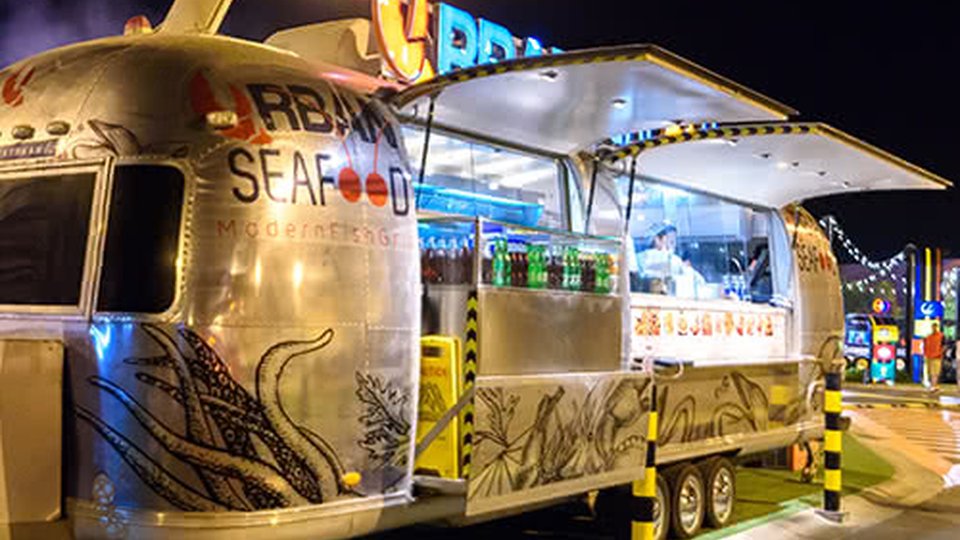Commentary
Considerations for choosing the right type of mobile food business
Mobile food is a growing industry, but a new operator must first decide between a food truck, food trailer or food cart. Each of the three options has its pros and cons.

December 2, 2020 by Richard Traylor — Writer, WebstaurantStore
Mobile food is the fastest growing commercial foodservice segment. In part one of this two-part series, we explored the three basic types of mobile food: food trucks, food trailers and food carts.
Each of the three types of mobile food vehicles has its own requirements for kitchen space, mobility, cost and serving events and locations.
While this is a lot to consider, there are still additional considerations among these three types of mobile food businesses. We will address these three options one at a time.
Option 1: food truck
A food truck is the combination of a motor vehicle and a kitchen. Food trucks are typically 16 feet long and 7 feet wide but can range in size from 10-26 feet long. This versatile vehicle is designed for street parking to serve pedestrians that may be passing by. Food is prepared and cooked in the vehicle and sold to individual customers from the window on the side of the truck.
Pros
- The kitchen does not need to be towed, making it extremely mobile and easy to take from one location to the next, more lucrative location.
- Being a single unit, you don't need a separate transport vehicle.
- The vehicle easily fits down most city streets and in most parking spaces, providing a simple driving experience.
- The compact size means fewer appliances to clean than a standard kitchen.
- The mobility makes it perfect for stop-and-go services and provides access to spots all across town.
- The versatility of the space allows for a flexible menu and menu experimentation.
- Since food trucks are extremely popular, they have excellent resale value.
Cons
- Automotive troubles mean your whole business stops until the issue is fixed.
- It has the highest upfront cost compared to other mobile food vehicles, usually $100,000 to $200,000.
- Maintenance and upgrades can prove to be expensive.
- There is a lot of paperwork, licensing and permits, including zoning permits, health permits, signage permits, alarm permits, etc.
- Limited kitchen space means a limited menu and staff.
- The built-in power generator can take up precious kitchen space.
- The more miles put on the truck, the more it depreciates in value.
Option 2: food trailer
If you're looking for more space, a food trailer may be the right option for you.
A food trailer is a mobile kitchen that you hitch onto a vehicle to tow from one location to the next. Kitchen trailers can vary greatly in size, ranging anywhere from 8-53 feet long and 7-8 1/2 feet wide.
These customizable vehicles are designed to cater to large crowds during multi-hour or even multi-day events like weddings and state fairs.
Pros
- The kitchen can be towed by any vehicle, so business does not need to stop for vehicle maintenance.
- Since the kitchen trailer and transport vehicle are not connected, the trailer can be dropped off at an event and the vehicle can be used to run errands during the event.
- It is generally less expensive than food trucks, and is up to 1 1/2 feet wider for more space.
- The size allows food business to cater large venues.
- The large internal blueprint provides ample space for full-sized equipment, ingredient storage, disposables and cleaning supplies.
- A full kitchen means you can offer a multi-course menu, have a full staff and serve several customers at once.
- Varying sizes allows you to find a food trailer in your budget and customized to your needs and specifications.
- It can be used as a secondary kitchen to expand on the space of an existing building or used as a primary kitchen during renovations/disaster relief.
- Mileage is not logged on the trailer, so you can continuously take it from location to location without worrying about depreciation in value caused by an increase in mileage.
Cons
- An external vehicle with a hitch is required to move the trailer, and the vehicle also needs to be powerful enough to tow the trailer.
- The size can make it difficult or impossible to maneuver down certain streets and can limit the number of parking locations available.
- Before moving the food trailer, it will need to be packed up and hitched back up to the transport vehicle.
- An external generator may be needed depending on the specifications of your trailer.
If you're looking to cater wedding venues with your mobile food business or establish a booth at your local state fair, a concession trailer may be the right choice to expand your business.
Option 3: food cart
A food cart is a compact mobile kitchen that can either be pushed by hand or towed with a car or bicycle. Food carts range in size from 4-7 feet long and 2-6 feet wide. The food server will generally serve from behind the cart since they are typically not enclosed structures. Most food carts only have one piece of cooking equipment and a warmer to hold food at temperature. Food carts are designed to attract foot traffic from nearby walking paths to serve an individual customer at a time.
Pros
- A cart is a highly affordable option for new business owners to get into the mobile food scene.
- Its compact size is perfect for busy sidewalks to target specific walking paths during lunch rushes in major cities.
- Its mobility allows you to bring food options to locations where large brick-and-mortar cannot go, such as parks, fairs and boardwalks.
- A cart does not need to be hitched to be transported, meaning that you can quickly readjust your location to target a more lucrative spot.
- It can help create a close relationship with locals because carts provide eye-level customer service.
- Its space-saving size allows for simple and safe storage overnight and during off-seasons.
- A cart comes with a reputation of a niche menu, allowing it to be known for its signature selections in the neighborhood.
Cons
- The lack of full-sized kitchen equipment limits the menu selections you are able to serve.
- The limited storage space does not allow for the storage of many ingredients, to-go containers or cleaning supplies.
- The mobility is fully dependent on your own foot power; an additional vehicle or bicycle may be needed to transport it further.
- The stigma associated with the lack of cleanliness of food carts can keep potential customers away.
Whether you're deciding between a food truck, food trailer or food cart, you can use the pros and cons above to find the perfect mobile food business for your menu.
About Richard Traylor
Richard Traylor graduated from Temple University in the winter of 2014 with a degree in Strategic Communications. After graduating, he taught English in South Korea for two years, during which he was fortunate enough to travel and see the world. In October 2016, he returned home and started to work in SEO Content at Webstaurant Store. This blog previously ran on Webstaurant Store.
 ChatGPT
ChatGPT Grok
Grok Perplexity
Perplexity Claude
Claude






